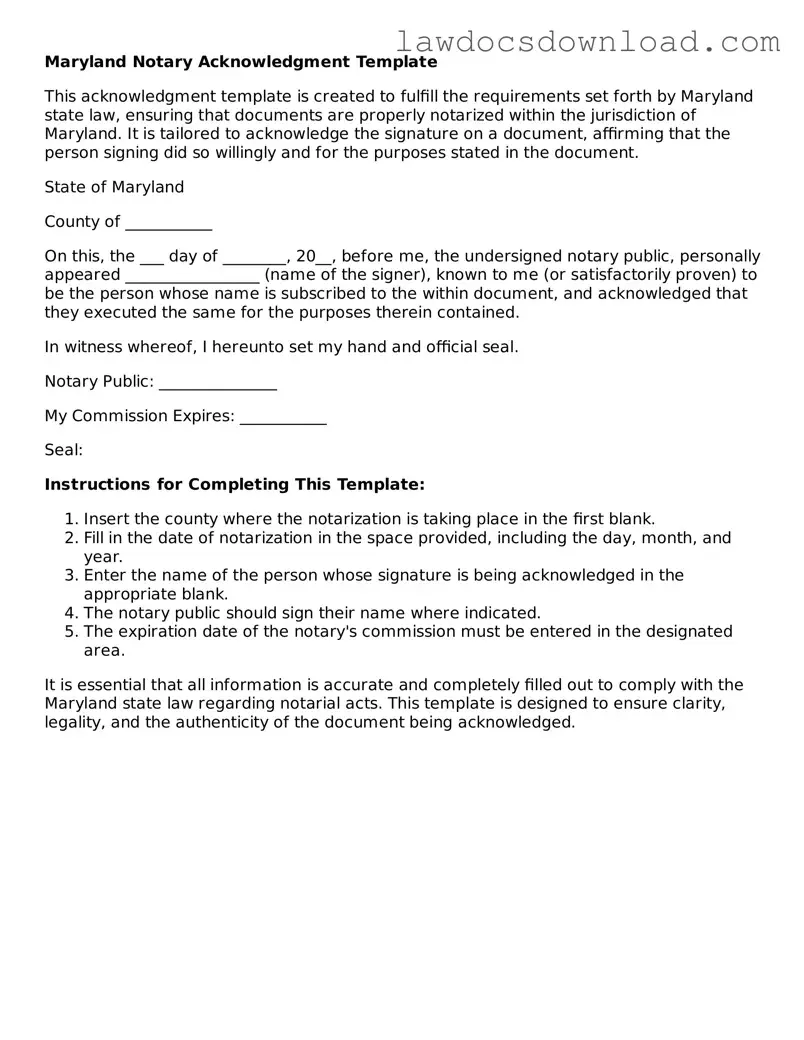The Maryland Notary Acknowledgement form shares similarities with a Jurat. Both forms are used by notaries to certify certain types of documents. While the acknowledgement form verifies the identity of the signatory and their understanding and willingness to sign the document, a Jurat also requires the signatory to swear to or affirm the truthfulness of the document's contents in the presence of the notary. This distinction highlights their respective uses in different legal contexts.
Another document akin to the Maryland Notary Acknowledgement form is the Power of Attorney (POA). A POA allows an individual to grant another person the authority to make decisions on their behalf. The link between the two documents lies in the necessity for a notary acknowledgment in many jurisdictions to validate the POA. This notary acknowledgment ensures the principal signs the POA willingly and under no duress, thus protecting all parties involved.
A Deed of Trust is also comparable to the Maryland Notary Acknowledgement form. This document, used in real estate transactions to secure a loan with the property being purchased, often requires a notary acknowledgment to confirm the signatory's identity and voluntary action. This legal formality helps prevent fraud and ensures that the document is legally binding.
The Quitclaim Deed, which transfers property ownership without any warranty regarding the title's quality, similarly needs a notary acknowledgment for validation in several jurisdictions. This requirement ensures that the individual transferring the property rights is doing so consciously and of their own free will, thereby providing a layer of legal protection for both parties involved.
A Mortgage Agreement often necessitates a notary acknowledgment, akin to the Maryland Notary Acknowledgement form. This legal document outlines the terms of a mortgage loan and secures the loan with the property in question. The notary acknowledgment certifies the borrower's signature, safeguarding against fraud and ensuring that the borrower fully understands and agrees to the terms.
Similarly, a Last Will and Testament frequently requires a notary acknowledgment in many states to ascertain its validity. This essential document outlines an individual's wishes for the distribution of their estate after their death. The notary's certification confirms the testator's signature as genuine, which is critical for the will's legal standing.
A Commercial Lease Agreement, which outlines the terms of a rental agreement between a landlord and a commercial tenant, often includes a notary acknowledgment. This legal requirement confirms that all parties have signed the agreement willingly and understand its terms, thereby protecting the interests of both the landlord and the tenant.
Finally, Living Trust documents share a commonality with the Maryland Notary Acknowledgement form. These documents, used to manage an individual's assets during their lifetime and distribute them after death, typically require notary acknowledgment to validate the settlor's signature. This ensures that the document is legally effective and reflects the settlor's intentions without coercion or undue influence.
In summary, the Maryland Notary Acknowledgement form is similar to various legal documents such as Jurats, Powers of Attorney, Deeds of Trust, Quitclaim Deeds, Mortgage Agreements, Last Wills and Testaments, Commercial Lease Agreements, and Living Trusts. Each of these documents uses a form of notary acknowledgment to verify the identity and willingness of the parties involved, providing a critical layer of legal protection and integrity to the agreements.

